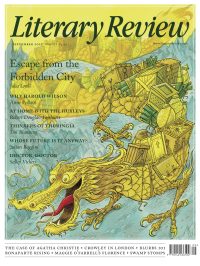Miranda Seymour
Dancing Up a Storm
Diaghilev’s Empire: How the Ballets Russes Enthralled the World
By Rupert Christiansen
Faber & Faber 384pp £25
It was Diaghilev’s adored stepmother rather than his ‘fun but feckless’ father, Rupert Christiansen tells us in this hugely entertaining book, who planted the seeds of a seemingly unremarkable young man’s exceptional self-belief. ‘Never say “I can’t”,’ Yelena Diaghilev told little Serge, despite his mediocre academic achievements and lack of musical talent. ‘When people want to, they can.’ As Christiansen observes, it was advice that the monumentally ambitious Diaghilev heeded.
Having come from remote Perm to fashionable St Petersburg in 1890 to study law (and to pursue pretty young men, a lifetime’s occupation), eighteen-year-old Serge started by chumming up with a group of earnest young intellectuals known as the ‘Nevsky Pickwickians’, before holding an art show of his own work (favourably reviewed by himself) and launching a magazine called The World of Art. Inspired by the London-based The Studio, it introduced Russian readers to Cézanne, Matisse, Van Gogh and Kandinsky. St Petersburg was subjected to another attempt to improve its taste when Diaghilev pretty much single-handedly sourced, fundraised for and presented a giant exhibition of portraits of Russian notables. A future Ballets Russes colleague, Léon Bakst, oversaw the paintings’ installation in the echoing spaces of a recently abandoned palace.
The key moment came in 1906, when Diaghilev decided to bring Russian tastes to western Europe. A big art show in Paris (with Bakst advising on the design) secured praise and recognition from the likes of Proust’s friend Robert de Montesquiou; the breakthrough came two years later, when

Sign Up to our newsletter
Receive free articles, highlights from the archive, news, details of prizes, and much more.@Lit_Review
Follow Literary Review on Twitter
Twitter Feed
Under its longest-serving editor, Graydon Carter, Vanity Fair was that rare thing – a New York society magazine that published serious journalism.
@PeterPeteryork looks at what Carter got right.
Peter York - Deluxe Editions
Peter York: Deluxe Editions - When the Going Was Good: An Editor’s Adventures During the Last Golden Age of Magazines by Graydon Carter
literaryreview.co.uk
Henry James returned to America in 1904 with three objectives: to see his brother William, to deliver a series of lectures on Balzac, and to gather material for a pair of books about modern America.
Peter Rose follows James out west.
Peter Rose - The Restless Analyst
Peter Rose: The Restless Analyst - Henry James Comes Home: Rediscovering America in the Gilded Age by Peter Brooks...
literaryreview.co.uk
Vladimir Putin served his apprenticeship in the KGB toward the end of the Cold War, a period during which Western societies were infiltrated by so-called 'illegals'.
Piers Brendon examines how the culture of Soviet spycraft shaped his thinking.
Piers Brendon - Tinker, Tailor, Sleeper, Troll
Piers Brendon: Tinker, Tailor, Sleeper, Troll - The Illegals: Russia’s Most Audacious Spies and the Plot to Infiltrate the West by Shaun Walker
literaryreview.co.uk